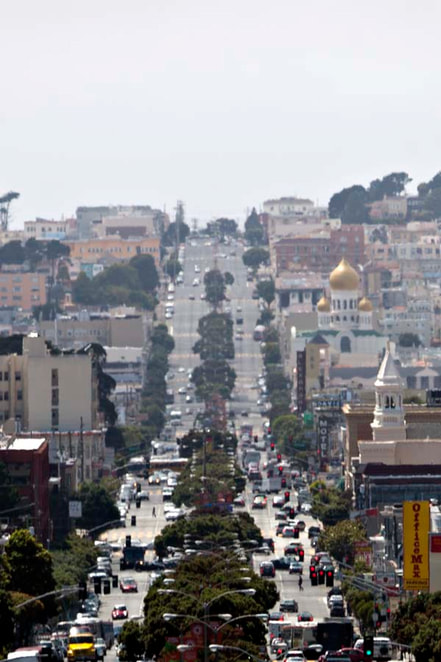 Geary Boulevard
Geary Boulevard The desert afforded Anthony refuge from the city, but he would not long enjoy uninterrupted silence. The first wave of intruders was demonic. Demons plagued him, especially at night, appearing in ghastly shapes unexpectedly in odd corners, at times physically beating and shoving him about. St. Anthony realized that he had gone into the solitudes precisely to do battle with these demons, who often come to us in the middle of the night. As I tell myself upon awaking from a bad dream in the wee hours, “never believe anything you hear at 3am.” Like many another saint with whom God permitted demons to bandy about, Anthony was at first terrified of these specters but eventually got used to them and learned how to beat them at their own game.
But then came the second wave of intruders: aspiring disciples who sought to live like him and dwell near him. His hermitage became a cluster of hermitages. Each time he would pick up and move a few miles away, other huts soon sprang up nearby. St. Anthony realized that it is never good for man to be absolutely alone, and so he founded “monasticism,” which is not isolation but communal solitude. The monk's prayer in the community chapel is just as vital as prayer in his solitary cell. We all need a healthy balance of together time and alone time.
But then came a third wave of intruders: townspeople. Word got about that a holy man was to be found in the local desert. The wealthy and the educated, the poor and the illiterate, the hopeful and the desperate made pilgrimage into the desert, such that in the words of Dr. Derwas Chitty, the desert became a city. St. Anthony realized finally that he was to have no absolute peace in this world; rather, God wanted him to grant peace to this world by finding it within himself, wherever he lived.
I live in a city, and actually on San Francisco’s heaviest traveled urban artery (Geary Boulevard), which transports 52,000 passengers every day just on its city buses. At first I could not sleep in the pastor's room, which faces the incessant Geary traffic on two sides. For three years I sought refuge in the room farthest from the street, but a few months ago I finally moved into the pastor's room. If I’m going to live in the city, I might as well make peace with its chaos.
Can I find my desert in this city? Can I find the silence of God in the mayhem of a city that prides itself in avowed irreligion? I think I can. If Anthony could make the desert a city, I suppose I can make the city a desert, full of God’s peace and joy.


 RSS Feed
RSS Feed